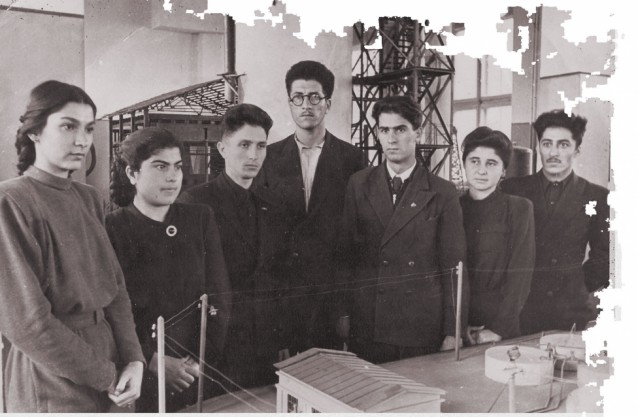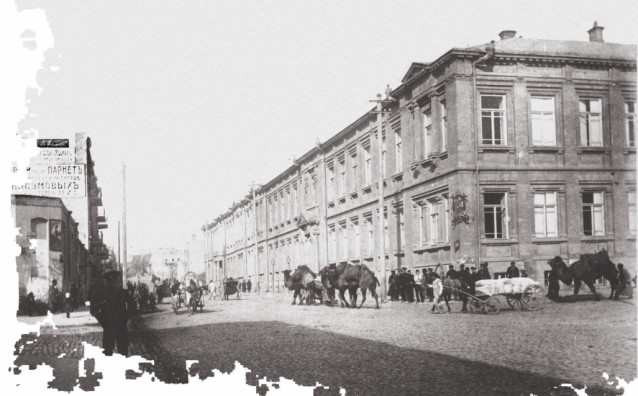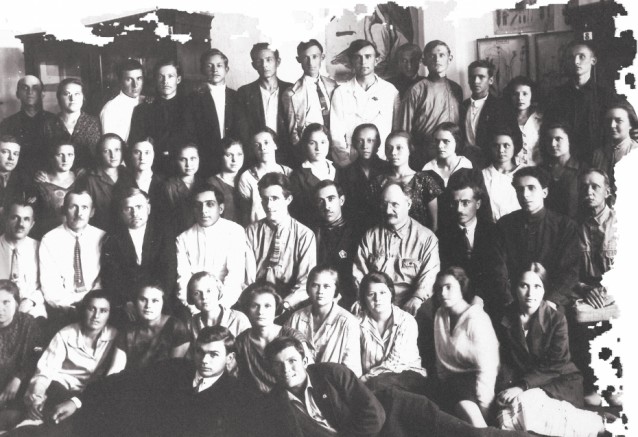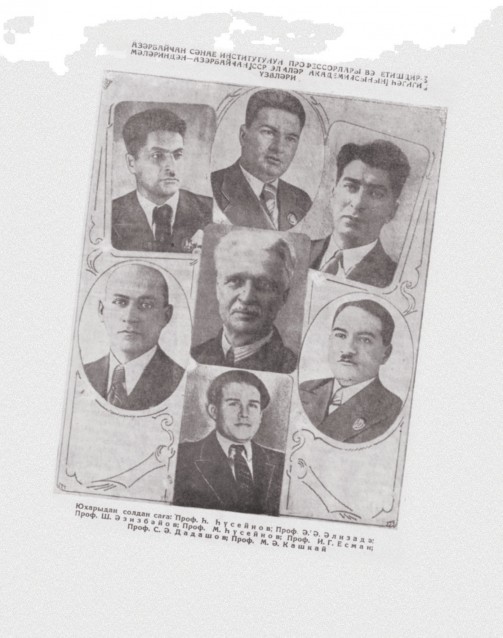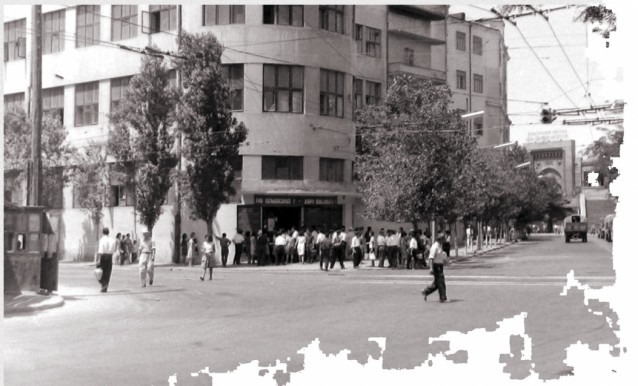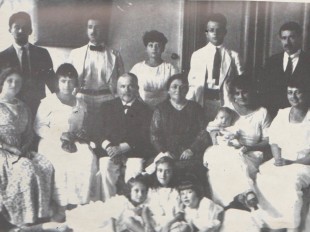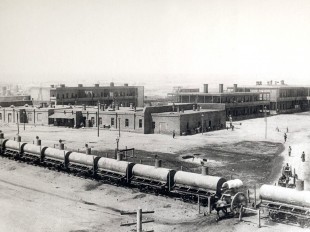In November 2015 the historic Azerbaijan State University of Oil and Industry celebrated 95 years (1920-2015). The following article explores its role during the grim years of the Second World War (1939-1945), highlighting the heroism of its teaching staff and students in achieving one goal - the defeat of the invading German forces.
Over the course of almost a century the first oil institute in the South Caucasus grew from a small academic establishment into one of the USSR’s major industrial institutes, and later, into a global oil institute. In September 2015 it was renamed from the Azerbaijan State Oil Academy to the Azerbaijan State University of Oil and Industry.
All the institute’s activities during the war years were aimed at achieving a single goal - to defeat the enemy
It has been well documented that the Second World War was a severe test for the nation, for each individual, collective, factory and university, because it radically interrupted the entire population’s peaceful and constructive working life – collective farms became arenas for fierce tank battles, tractor levers were turned into gun triggers and the search for oil evolved into enemy reconnaissance missions.
For the Azerbaijan Oil Institute (at that time called the M.Azizbekov Azerbaijan Institute of Industry or AzII for short) the war presented several burning issues which needed to be solved immediately. At a general meeting of staff and students on 2 June 1942 the institute’s main wartime goals were determined. They included producing new types of measuring equipment and chemical glassware for the oil industry, new medicines from local raw materials and increasing production of weapons parts and instruments for ammunition factories.
A proactive approach
The oil institute’s contribution to the victory over fascism was characterised by concrete action: during the war drilling on the Absheron Peninsula was stopped, and at the request of the Communist Party many of the institute’s graduates went to the eastern part of the Soviet Union where they played an active role in exploring the rich oil and gas fields of the East. All the institute’s activities during the war years were aimed at achieving a single goal - to defeat the enemy. Training oil engineers, discovering new drilling methods and lecturing at enterprises - everything was connected with the war and contributed to victory.
Assistance to the front was extremely diverse. On 18th March 1942 the newspaper Baku Worker wrote that in the severe conditions of 1942 the entire educational and ideological work of Azerbaijan’s higher education institutions had been reoriented towards the war effort:
Peaceful topics gave way to military ones - everything that helped to hasten the defeat of the German fascists.
AzII students fought in the Caucasus and the Ukraine, Belarus and the Crimea, Moldova and the Baltic states, near the walls of Leningrad and in the battles for Moscow and Stalingrad. Among them were the former dean of the Faculty of Oil Engineering, I. Semyanisty, who was awarded the Order of the Red Star; N. Guliyev, a student in the Faculty of Oilfields, won the Medal For Courage; P. Klimov, an AzII student was awarded the title “Hero of the Soviet Union,” and many others.
The oil institute’s staff and students made this significant contribution to victory combining studies in the classroom with digging trenches, and by solving a number of scientific and technical issues that were of great importance to the nation’s defence. In post-war Soviet documents Azerbaijan and in particular Baku were credited with becoming a significant armoury for the Red Army.
Oil & innovation
The role of oil deserves a special mention. The country naturally needed oil, and in large quantities since the outcome of the war depended on who had the quicker, stronger and more powerful engines, which in turn depended upon the amount and quality of fuel. This meant that more oil had to be produced, but the oil wells also had to be exploited as efficiently as possible.
To do this, one of the institute’s assistant professors, L.F. Kulikovsky, developed a new design - a mechanical dynamograph, which was an instrument to research deep within oil wells and became widely used by the Azerbaijani oil company Azneft. Kulikovsky also designed a mechanical drillometer - a device that monitors the underground repair of oil wells. The Institute’s scientists, led by S.M. Guliyev, also invented and implemented an oilfield tool called the mercury-free flow meter, which significantly improved productivity.
During the war years AzII’s Faculty of Oilfields held some 300 consultations and technical briefings with Azneft engineers, technicians, inventors and innovators. Under the guidance of Professor Z.B. Yelyashevich, the institute’s specialists worked on developing new monitoring and measuring instruments for the oil industry.
Every minute counted since ever more raw materials and fuel were required for the war effort, and the institute’s scientists carried out their tasks quickly and efficiently. Away from the front lines, the Thermodynamics, Boiler Systems, Plumbing and Construction Operations departments worked together to provide temporary settlements for civilians evacuated from various regions of the Soviet Union to Azerbaijan.
AzII students fought in the Caucasus and the Ukraine, Belarus and the Crimea, Moldova and the Baltic states, near the walls of Leningrad and in the battles for Moscow and Stalingrad
Between 1941 and 1944 German troops temporarily occupied considerable parts of the Soviet Union, sharply reducing supplies of raw materials for the unoccupied territories. New mineral deposits had to be found as soon as possible. Instructed by the Azerbaijani State Geology Department and Azneft, the institute’s geologists, A.Z. Vezirzadeh and K.A. Alizadeh, studied a huge number of rock samples and found valuable deposits of volcanic ash, dolomite and shale for the oil industry.
The Department of Analytical Chemistry led by Assistant Professor G.B. Shakhtakhtinsky also made a significant contribution, creating a number of substances needed for defence purposes. Engineers were trained in the institute’s Faculty of Oil Mechanics as specialists in oilfield and refinery equipment and the automobile industry. Since the end of 1945 this faculty has also trained specialists in oil engineering technology.
A number of other departments and individuals at the Azerbaijan Industrial Institute also made significant contributions to the war effort, such as the Department of Organic Chemistry, which studied the anti-shock properties of alpha oxides and their compounds in a bid to improve the quality of petrol. Assistant Professors O.G.Pipik and D.O.Goldberg made a significant contribution to Soviet defence technology by improving the quality of lubricating oils.
The Department of Oilfield Power Production ensured the smooth operation of the oil fields by providing crucial, strategic raw materials during the war. This department also did the important job of coaching power and oilfield specialists on how to operate during wartime, when uninterrupted electricity supplies for buildings and facilities were essential and production needed to be restored rapidly.
A diverse contribution
Azneft’s leadership provided the following appraisal of the oil institute’s contribution during the war, writing in a greetings message to the institute:
Thanks to the tireless fruitful work of our scientists and academic staff during the war, the oil industry of Azerbaijan found solutions to a number of difficulties. Due to the lack of equipment and scarce materials, we appreciated the essential guiding role of the professors and academic staff of AzII in the most difficult areas and in the crucial days of the war.
AzII’s assistance to the front was not limited to the above. All sorts of activities and events were carried out, including outreach programmes amongst the general population, lecturing, collecting resources and materials for the country’s defence fund. Subscriptions to the second and third state loans were held in AzII, as well as for the third and fourth cash and prize lotteries, for which the staff’s work was mentioned in a special decree by the People’s Financial Committee of the republic.
Moreover, the institute’s staff collected and donated 112,256 roubles to build an entire tank column, for which they received the gratitude of the country’s supreme commander, Joseph Stalin:
Please convey to the faculty’s staff, students, male and female workers, and employees of the Azerbaijan Industrial Institute named after Meshadi Azizbeyov, who collected one hundred and twelve thousand two hundred and fifty-six roubles for the construction of a tank column, my fraternal greetings and the gratitude of the Red Army.
The institute’s staff collected and donated 112,256 roubles to build an entire tank column, for which they received the gratitude of the country’s supreme commander, Joseph Stalin
Moreover, the Azerbaijan Institute of Industry donated books worth 124,147 roubles to the Moscow, Grozny and Ufa petroleum institutes, to the Baku and Krasnovodsk technical colleges, and to the Krasnodar industrial complex.
Forging young graduates
The institute provided daily assistance to the front and continued training oil specialists. The newspaper Baku Worker repeatedly wrote about the activities of AzII during the war years, emphasising in particular:
the Azerbaijan Institute of Industry the forging house of combat and technical personnel, produces a huge number of new specialists for the defense and oil industries. It is they - the young graduates - who have replaced at the drilling machines, in the workshops of oil refinery plants and installations, those who, weapons in hand, defended the honour and independence of our country. It was they, these new cadres of professionals, who had to search for new prospective oil fields (18th March 1942 edition of Baku Worker).
Due to the outbreak of war, postgraduate studies were temporarily suspended, but graduates were already being received again in 1943. By 1944 the institute had 14 postgraduate students.
To demonstrate its prolific scientific activity during the war, AzII completed 275 scientific theses, more than during the entire previous seven years. The money spent on research between 1941 and 1945 was almost twice as much as the previous seven years leading up to the war.
In addition, a training department was operating between 1941 and 1945 and from 1st October 1944 four-month preparation courses were run for school leavers who had applied to study at the institute in the winter of 1945. During the course of the bloodiest war the world has seen, AzII produced over a thousand highly qualified engineers and specialists, including drilling technicians, geologists, engineers, builders and economists.
Master principals
Finally, it is worth highlighting the names of the principals who led the institute during the difficult wartime period and in the immediate postwar years - Musa Aliyev (1939-1941) and Saleh Gojayev (1941-1960). Musa Aliyev was a prominent scientist and talented teacher who made an enormous contribution to the development of AzII’s academic foundation and to creating the institute’s technical laboratory during the war.
The oil institute’s staff and students made this significant contribution to victory combining studies in the classroom with digging trenches
Saleh Gojayev, as the institute’s principal, kept a close eye on production on a daily basis. He was a great inventor who designed an oil truck with eight gears. He also created the first drill winch mounted on a separate foundation rather than being joined to a tower, and which had a cooled braking system. The principles behind the ‘Gojayev winch’ largely predetermined the development of modern drilling equipment in Azerbaijan.
Of course, it is impossible to cover everything and everyone in a single article, but this is a summary of the crucial role played by the first oil institute in the South Caucasus during the harsh years of the war, during which it contributed a number of inventions and discoveries which hastened the eventual victory, as well as turning thousands of students into highly qualified specialists and engineers who would supply the Red Army with much needed arms and fuel.
About the author: Mir-Yusif Mir-Babayev is a Doctor of Chemical Sciences and Professor at the Azerbaijan Technical University, who has recently been awarded the Progress medal for his contribution to the Azerbaijani oil and gas industry.